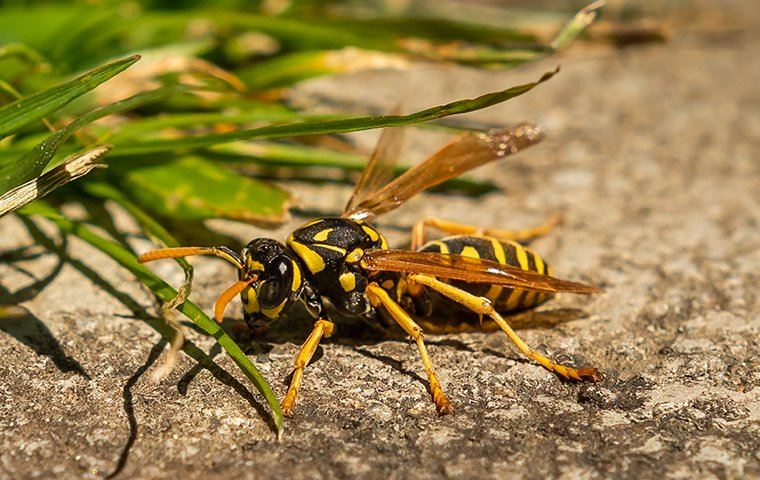
Stinging Insect

What are stinging insects?
Insects with stingers extending from the abdomen are referred to as stinging insects. Wasps, yellow jackets, bees, and hornets are all types of stinging insects living in the Denver and Omaha areas and throughout most of the country. Eco-important, stinging insects help to pollinate, control populations of garden pests and dangerous insects, and produce honey that we consume.
Stinging insects vary in size, color, and behavior depending on their species. Opportunistic, they will take advantage of any space that provides them with a sheltered area to build their nest out of the way of most predators. Food and water are other selling points for stinging insects when choosing a place to nest.
-
How can I prevent stinging insects in the future?
Prevent future problems with stinging insects with the help of our easy and practical prevention tips:
- Remove natural structural from your property that stinging insects can nest in — dead trees, tree stumps, and brush piles.
- If you noticed a particular shrub, bushes, tree, or plant is attracting hordes of stinging insects, it might be a good idea to remove it from your property.
- Maintain your lawn and keep the grass cut short; flowering weeds like clover attract hungry stinging insects.
- Doorways, decks, tree houses, playhouses, fences, and furniture make perfect nesting sites for stinging insects, and regularly inspect them for nests.
- Seal spaces in your home’s exterior walls to keep stinging insects out.
Learn more about our home pest control and commercial pest control services.
-
How do I get rid of stinging insects?
If you live in the Denver or Omaha area and are experiencing problems with stinging insects, you need to contact Beeline Pest Control! We will complete a thorough inspection to identify the species nesting on your property. Our professionals understand the behavior and life cycle of the different stinging insects in our area and provide the best services to remove the nest safely.
At Beeline Pest Control, we focus on our customers, treating everyone as individuals, and providing the customized services needed to maintain a pest-free home. To learn more about our stinging insect control services, or for a free quote, call today.
Honey bees are highly important to the ecosystem. They are responsible for the pollination of many flowers, plants, and crops. If honey bees become a problem on your property, it is important to call us so we can direct you to a beekeeper that can remove the nest while keeping the colony intact.
-
Where will I find stinging insects?
Ground nesters like yellow jackets place nests in naturally occurring ground holes they find in our yards or other outdoor spaces. They also build nests under woodpiles, rock piles, or fallen trees. Yellow jackets are a type of scavenger that eats proteins and sweets; this means they are often are a problem around trash cans, recycling bins, and outdoor eating areas.
Wasps and hornets both create nests from a paper-like material they make out of untreated wood they strip from trees and untreated wooden structures and mix with their saliva. Hornets, wasps, and bees typically like to build nests aerially. Some favorite nesting spots include tree branches, utility poles, under roof eaves, in doorways, behind window shutters, and on chimneys, decks, or rafters.
-
Why do I have a stinging insect problem?Unfortunately, most of our yards provide stinging insects with their basic needs, and deterring them is a difficult task. Stinging insects become problematic, unwanted pests when they decide to nest in an area that puts people, children, or pets in danger. Stinging insects will create a nest anywhere that provides them with their basic needs. Properties located near wooded areas, parks, meadows, and bodies of water are very susceptible to becoming a home to stinging insects.
-
Are stinging insects dangerous?
When working outside, spending time in your Colorado backyard, or when in any outdoor space, there is the potential to accidentally come into contact with a stinging insect or a nesting site. Stinging insects pose significant risks to people, especially those allergic to their venom. An allergic reaction can range from pain and swelling around the sting site to anaphylaxis.
When stinging insects build a nest on your home or on something in your yard like a play structure, fence, or piece of outdoor furniture, there is a high likelihood that a sting will occur.

Hear From Our Happy Customers
At Beeline Pest Control, your satisfaction is our priority! See for yourself what our customers have to say about working with us.
-
"Excellent Care"
I highly recommend this company and will call on them again!!
- Angie M. -
"Very Attentive"
From the office staff to the technicians, they continue to uphold their reputation of being the best.
- Regina J. -
"Couldn't Be Happier"
They offered to come back within a few days if the problem wasn't resolved, but that wasn't necessary. Would use again and would recommend.
- Eric W. -
"Great Service"
The technician was very friendly and professional.
- Justin F. -
"Quick Response Time"
Everyone we have dealt with so far has been very helpful.
- Candice S. -
"Very Impressed"
He was thorough and asked me where the problem was concentrated and was very knowledgeable with his answers.
- Erin E. -
"Great Job"
It’s nice to live in a clean safe environment.
- John V. -
"Nailed It"
It has now been several years and tenants have not heard or seen a single mouse.
- Linda W.



